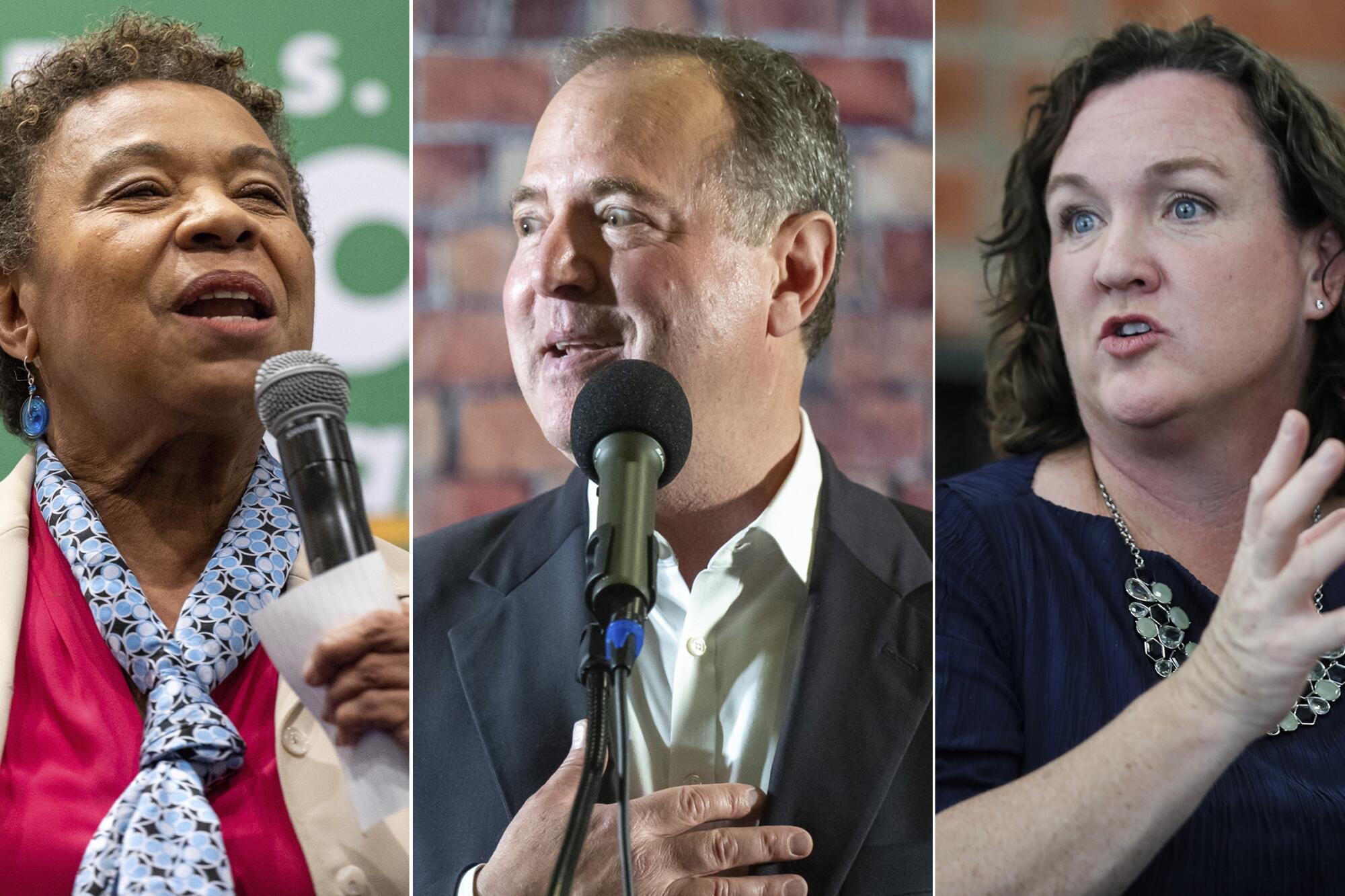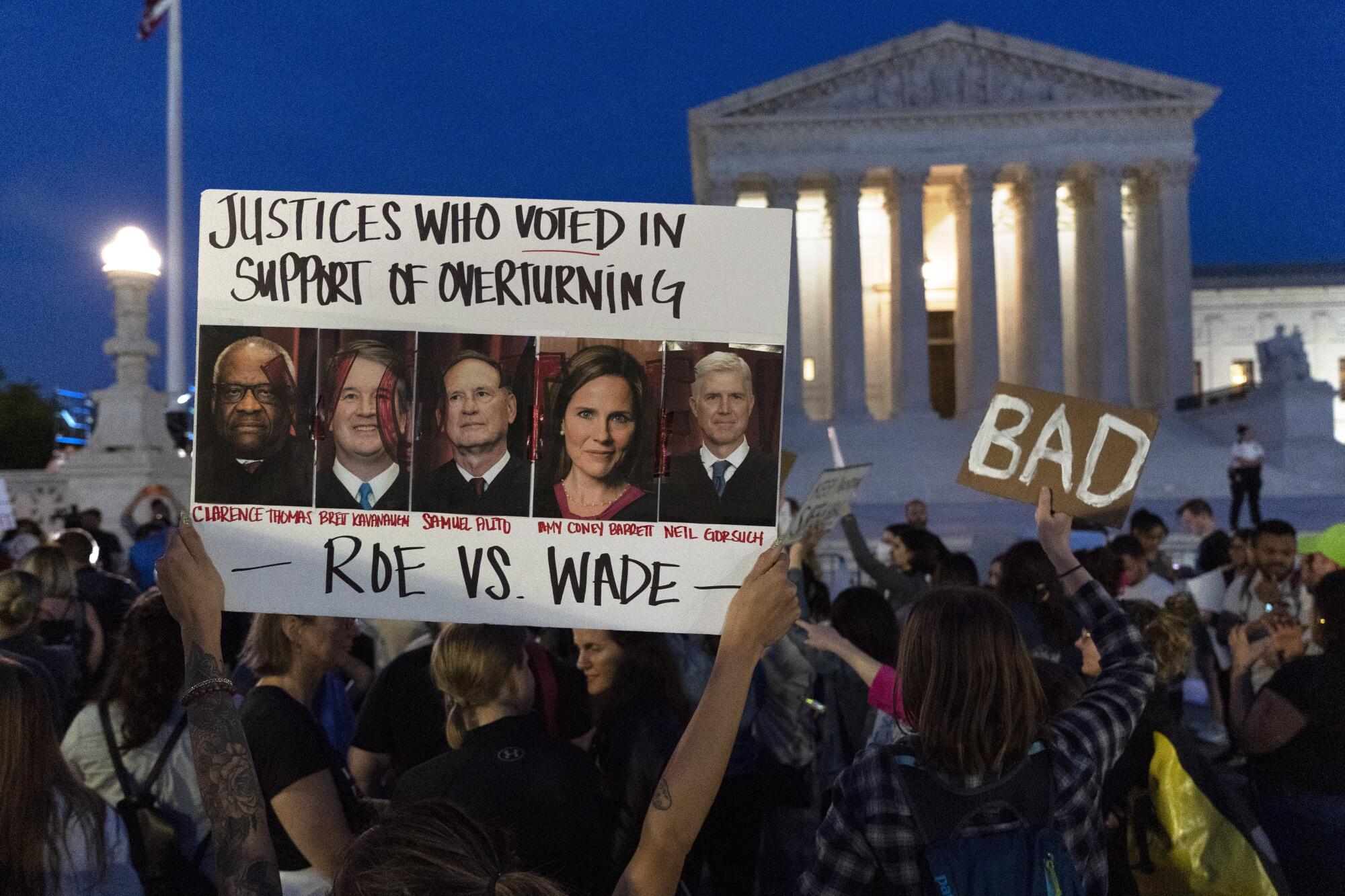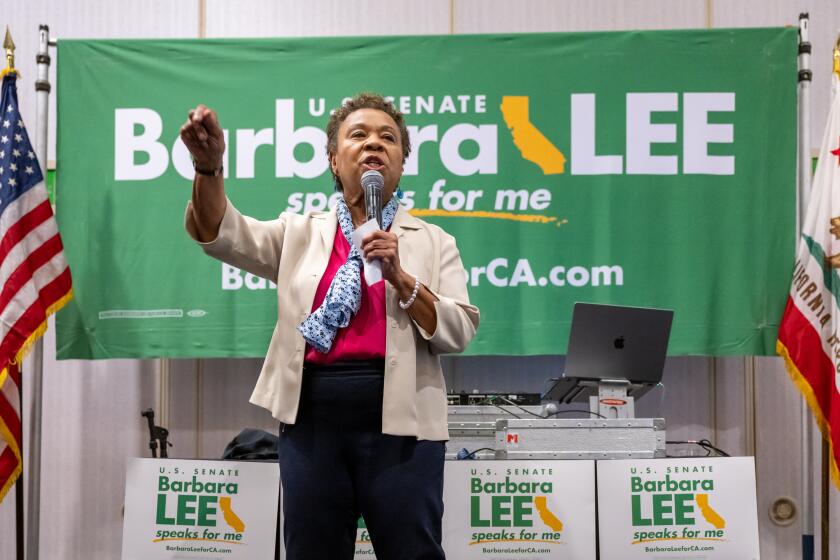
- Share via
It’s been just over a year since the Supreme Court overturned the landmark 1973 Roe vs. Wade decision, allowing states to once again outlaw abortion.
The decision — along with its rulings invalidating affirmative action programs, climate protections, gun control laws and the Biden administration’s student loan forgiveness policy — has thrust the conservative court into the cauldron of the 2024 election.
Revelations of questionable ethical behavior by some justices have further exacerbated the public’s growing distaste for the nation’s highest court, polls show, especially among Democratic and independent voters.
None of this has been lost on the top three candidates running in the 2024 election to replace retiring Sen. Dianne Feinstein of California.
Not only have Democratic Reps. Adam B. Schiff, Barbara Lee and Katie Porter all endorsed instituting more-stringent codes of conduct for justices, but the three also want Supreme Court justices to be bound by 18-year term limits of active service. They also support expanding the court from nine justices to 13 — a proposal that has been met with far less enthusiasm by some other Democrats, including President Biden, Senate Majority Leader Charles E. Schumer and the state’s other senator, Alex Padilla.
The harmony on the issue among Lee, Porter and Schiff may not be surprising in a state as left-leaning as California, but it does provide a preview of what’s to come in the presidential race and congressional elections, when Supreme Court expansion and other efforts to rein in its power will be among the top priorities of liberal activist groups and Democratic voters.
“As practical policy, I think the proposals are less important,” said Charles Franklin, director of the Marquette University Law School Poll, which takes public opinion surveys on the court.
The proposals are “more important for sending signals to your voters, that you’re mad as hell about the court. And here’s something you can at least imagine doing,” Franklin said. “I will point out that adding four more members is a lot more fun if you’re a Democrat, as long as Biden says yes. It becomes a lot less fun if Donald Trump is elected next year.”
In the spring, Demand Justice, an organization devoted to court reform and expansion, helped organize a statewide bus tour that included appearances with Lee, Schiff and Porter, who have all put their names to legislation that would expand the court to 13 justices.
The tour highlighted some of the behavior of justices including Samuel A. Alito Jr. and Clarence Thomas, who have been the subjects of a series of stories about their finances and vacations with wealthy individuals.
Reporters at ProPublica found that real estate tycoon Harlan Crow had paid for private boarding school for Thomas’ teenage grandnephew. Crow also bought Thomas’ mother’s home.
In Alito’s case, ProPublica reported that the justice didn’t disclose a vacation to Alaska he took with billionaire Paul Singer, who has on multiple occasions had business before the court.
In recent years, Senate Democrats have introduced bills to institute a code of ethics for justices and to create a recusal standard and stronger disclosure rules around their travel. Last month, bills including some of these changes were advanced by the Senate Judiciary Committee, though it’s unclear whether the full Senate will take up the legislation.

Hopes of expanding the court appear much dimmer, with just three senators sponsoring legislation to add more justices to the bench. Even Padilla. who supports reform, has been unwilling to endorse expanding the court.
“Americans are losing faith in the legitimacy of the Supreme Court when, in decision after decision, the right-wing majority is rolling back fundamental rights,” Padilla, who sits on the Judiciary Committee, told The Times in a written statement.
“I’m working with my colleagues on the Senate Judiciary Committee on proposals to structurally reform and rebalance the Court. And we are also holding hearings on one the most urgent needs — an enforceable code of ethics for the court to help regain public trust.”
Brian Fallon, who was Hillary Clinton’s 2016 presidential campaign spokesman, said the political reality is that major changes to the court aren’t going to happen soon.
For starters, any legislation to change the court’s size would require either the support of more Democrats in the narrowly divided Senate or the abolition of the Senate filibuster — which progressive activists also desire.
The push for court expansion, he said, is part of a decades-long project akin to the conservative movement’s efforts to undo abortion rights and move the court to the right.
“That we already have such a large majority of Democratic voters on board with this idea is a signal that the public is ahead of where lawmakers are on this,” said Fallon, who is the departing executive director of Demand Justice.
“Competitive primaries — definitely at the presidential level, but even in a big statewide election, like this California Senate race — have a way of expediting that process of new policy ideas catching fire and being adopted more broadly by candidates that need the support of advocacy groups and voters,” Fallon said.
After some frustration with Sen. Dianne Feinstein’s refusal to step aside at 90, some in California wonder whether Rep. Barbara Lee, nearly 77, is too old for the job.
Early in his term, Biden appointed a commission to study possible changes to the court. It didn’t recommend expansion, and this summer the president told MSNBC: “If we start the process of trying to expand the court, we are going to politicize it maybe forever, in a way that is not healthy.”
Even if he doesn’t endorse expansion, Biden has been clear that he thinks the court has actually thrown away mainstream conservative ideology in some of its decisions.
The Supreme Court has not always had nine justices. In the 19th century, it grew from six justices to 10, only to lower that to nine in 1869. The last serious effort to expand the court came in the late 1930s, when President Franklin D. Roosevelt tried to add up to six new justices as a way to protect his New Deal initiatives from being ruled unconstitutional.
The effort, which came to be known by Roosevelt’s opponents as “court packing,” failed.
For Schiff, a Harvard-trained attorney and former member of the House Judiciary Committee, watching then-Senate Majority Leader Mitch McConnell refuse to hold a vote on Merrick Garland’s Supreme Court nomination for most of 2016 was horrific. The Kentucky Republican argued at the time that it was too close to the end of President Obama’s term.
Then, Schiff said, he watched McConnell turn around and jam through President Trump’s nomination of Justice Amy Coney Barrett just weeks before Biden’s victory in 2020.
The Burbank Democrat noted that Trump had appointed three justices to the court while President Carter appointed none.
“What people know about expanding the court, they associate with Roosevelt and court packing, and I think we need to make the case that, ‘No, the court has already been packed,’ and the question is whether there’s action taken to restore balance on the court,” Schiff said in an interview.
“This issue has a particular power and salience now, both because of the gamesmanship that McConnell used but also because of the succession of reactionary cases coming out of the court — striking down Roe vs. Wade, and striking down administration policies on clean water and clean air, as well as overturning decades of precedent on affirmative action.”
Californians are overwhelmingly enamored of the state and appreciate its diversity. Still, about 40% of residents are considering leaving, mostly because of the costs.
Neither Lee nor Porter agreed to be interviewed for this story, but both have broadly echoed Schiff’s view calling for court expansion, term limits and other reforms. Both have pointed to decisions and the behavior of the justices as signs of a democracy being imperiled.
“This decision came as the final blow after a week of Supreme Court decisions turning back the clock on equality and threatening the strength of our economy,” Porter’s campaign wrote in a fundraising pitch sent out days after Biden’s plan to forgive up to $400 billion in student loan debt was struck down in a 6-3 Supreme Court decision.
“This Supreme Court isn’t just conservative, it’s corrupt,” said Porter, a UC Irvine law professor.
After the Dobbs vs. Jackson ruling last year, which overturned Roe vs. Wade and ended a court-protected right to abortion that had existed for nearly 50 years, Porter said the “decision to overturn Roe is a direct assault on liberty, equality and justice for all.”
Pointing to other rulings, the Harvard Law School graduate said the court’s decision to depart from precedent-setting decisions of the past is leading to a crisis of legitimacy.
Lee has expressed similar views, arguing in a recent fundraising appeal that the court’s members can’t credibly make decisions on the weighty issues of the day when they’re “potentially putting their own financial interests ahead of their sworn duty to uphold the Constitution.”
“Voters know we cannot maintain the status quo,” Lee said in a written statement to The Times. “Court reform goes beyond progressive politics — the future of our democracy is at stake.”

National polls show the court’s popularity has declined in recent years. In a July Pew Research Center survey of voters, just 44% of respondents had a positive view of the court, while 54% said they had an unfavorable opinion of the court, its lowest point in 30 years. As recently as summer 2020, 70% of respondents had a favorable view and 29% had an unfavorable view.
Support for term limits for justices has been strong across the ideological spectrum in recent years, with around three-quarters of voters favoring the idea, according to polls by Marquette University Law.
Proposals for court expansion are far more divisive. Last fall, two Marquette surveys showed that about 70% of Democrats favor expanding the court, up from just under half in the summer of 2019.
About three-quarters of Republicans opposed the idea last year, up slightly from around two-thirds in 2019.
Expanding the court and creating term limits for its justices are remedies backed by Planned Parenthood and NARAL Pro-Choice America to protect abortion rights. Franklin and others said that the influence of such groups in competitive Democratic primaries will push candidates to stake out clear positions on the subject.
Mini Timmaraju, president of NARAL, said it was essential for her organization to get behind structural change and not just policies that expand access to abortion.
The rollbacks of reproductive rights, she said, mean there’s a desire to take advantage of this “new level of American support for abortion access. But if we don’t do something about the court, all of that progress, which would be incredibly hard to get, will be undermined by this same exact court.”
“It’s a young court. They’re going to be there for a long time. We’ve got to do something about it.”
For Timmaraju and others, the California Senate race is a place to start.
More to Read
Sign up for Essential California
The most important California stories and recommendations in your inbox every morning.
You may occasionally receive promotional content from the Los Angeles Times.













